A Simple Guide for Interviewees
I have produced a number of documentaries in the past ten years throughout Maine, along with “documentary-style” short web videos. Some of these media productions are about the arts or artists; social issues and topics. Some historical. These projects are the most creative for me. There’s a lot entailed: music, b-roll, building moods through stories. But each project begins with the documentary interview. There may just one or multiple interviews, whichever the case, the documentary interview is the driving force. It tells the story.
An effective documentary interview appears easy
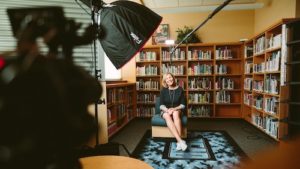 Some of my interviewees have prior experience speaking before the camera, however most people don’t. If you are someone that speaks in front of crowds or give frequent presentations, this doesn’t necessarily mean you are at ease in front of a camera. Or shall I say, speaking before a camera. It doesn’t come naturally to most people. The presence of a video camera automatically makes some people tense. Additionally, a second camera, microphones and lights heighten anxiety. Ultimately, whether you are a professional or amateur speaker, I offer a simple yet effective guide for my subjects.
Some of my interviewees have prior experience speaking before the camera, however most people don’t. If you are someone that speaks in front of crowds or give frequent presentations, this doesn’t necessarily mean you are at ease in front of a camera. Or shall I say, speaking before a camera. It doesn’t come naturally to most people. The presence of a video camera automatically makes some people tense. Additionally, a second camera, microphones and lights heighten anxiety. Ultimately, whether you are a professional or amateur speaker, I offer a simple yet effective guide for my subjects.
Do your homework
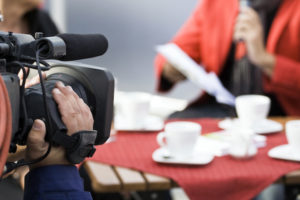
Knowing what to expect is key to preparing yourself to be interviewed. Learn more about the producer or filmmaker. Watch some of their videos online. Notice their style. Does the video seem fluid? Notice how often you see who’s speaking and when their voice carries over to the images. Is their one camera on the subject or two? There are numerous styles and types of documentaries, knowing more about who is behind the camera will help you prepare for your role in production.
Find out how long you are expected to be on the scene. Depending on the video production, the interview could last an hour or up to a full day. Short “documentary-style” web videos tend to be on the shorter end, an hour or two. Likewise, for a feature, it could take multiple days. However, the scene needs to be set up first: camera(s) placement, audio check, lighting and this takes time. Depending on the project, the interviewee doesn’t need to wait around for the set up. In addition, for multiple interviews, the producer and/or marketing director should have set times for each participant; enough time so that interviews do not overlap and people are waiting around unnecessarily.
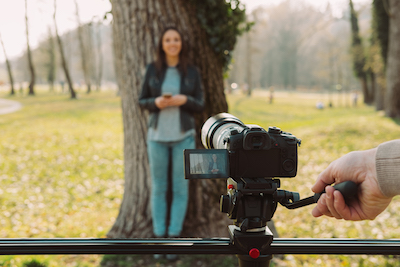 Ask questions beforehand
Ask questions beforehand
I always welcome questions prior to any shoot. Should you wear a certain color? Will you be wearing a small lav mic? What are the questions? Can you hold your notes in hand? Will you be sitting down? Standing? Or moving around?
Typically, as the filmmaker, I let my interview subjects know that I will put a wireless mic on them and therefore a button up shirt, vest or jacket will do. I usually check out a location prior to filming so I know what colors the subject will want to avoid wearing. I don’t recommend holding onto your notes as people either refer to them while speaking or unconsciously play with the notes, which gets picked up on the audio. Furthermore, I film most of my interviews seated, though I’ve shot interviews where the subject is standing. Don’t be afraid to ask questions leading up to the shoot date. A smooth production is one in which everyone is on the same page.
Don’t over prepare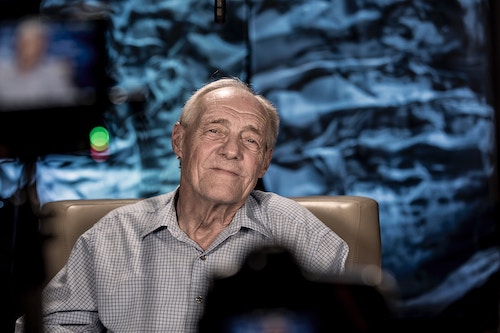
I always advise my documentary interview subjects to know what they want to say, but don’t memorize. By memorizing, people get caught up in their head trying to say what they want to say in an exact order. However, this takes away from the authenticity of the message. And it trips people up and often times frustrates them. Lastly, it doesn’t look natural; they appear rigid and stiff.
You should receive a list of questions you are going to be asked prior to the shoot so you can be prepared. Write up a brief outline of what points are important for you to hit. Think about how you want to say it effectively, but don’t write a script. Maybe practice briefly before a friend or family member, but don’t overthink it. And always keep in mind that you don’t have to nail the first take. This is the beauty of editing. Don’t be afraid to say “Can I start over?” Ultimately, if you speak from the heart on what you know, and do so confidently, the results will be competent and compelling.
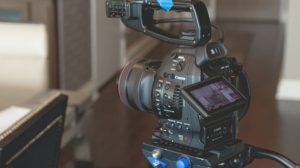 In conclusion, your documentary interview should be a rewarding experience. Your part in this storytelling process is meaningful and important. The producer and/or their team want you to be comfortable and self-assured. Without you, they have no story.
In conclusion, your documentary interview should be a rewarding experience. Your part in this storytelling process is meaningful and important. The producer and/or their team want you to be comfortable and self-assured. Without you, they have no story.
Click here to view some of my recent documentary media productions. If you would like a quote for a video production please fill out my Contact Form.

